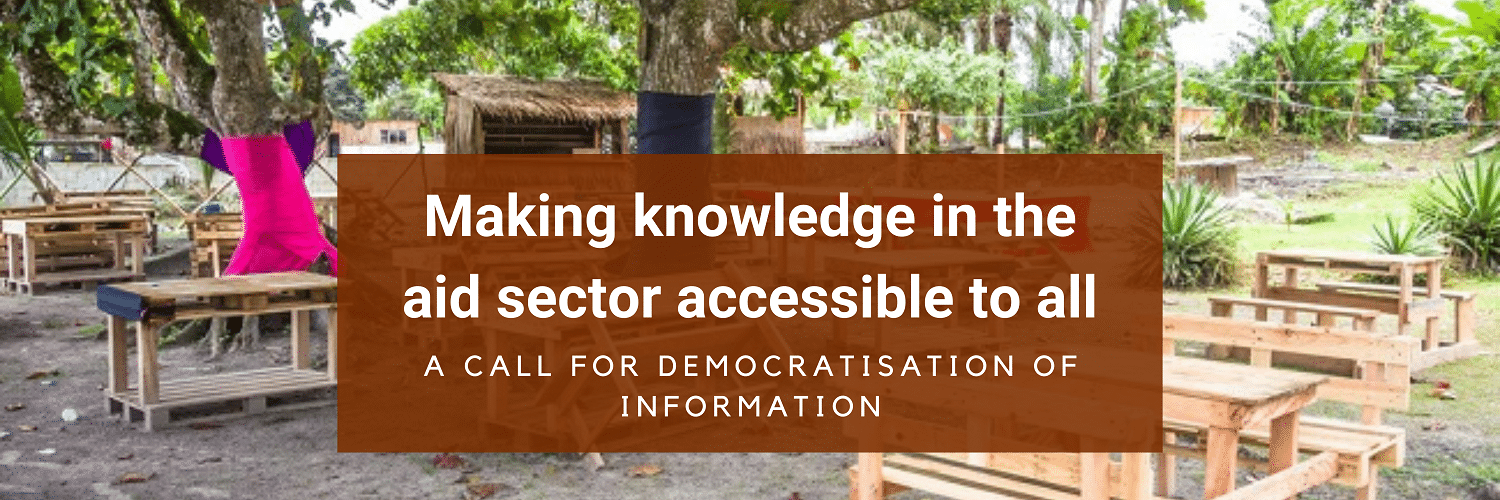
Making knowledge in the aid sector accessible to all
Knowledge required to provide aid and support at times of need currently resides within a wide variety of organisations. Crucial information and expertise needed to effectively and efficiently respond to crisis and aid responses is often fragmented and often inaccessible to actors at different levels. The problem with this is that fragmented information cannot be efficiently utilised, impacting humanitarian assistance and aid projects negatively.
What is needed is a knowledge management framework that integrates knowledge and information from diverse sources and makes it available to all who need it. Comprehensive information that is relevant, accurate and reliable and can be accessed 24/7 is critical to aid responses, health care providers and service provision. The faster a humanitarian community can access and assimilate crucial information, the quicker and more effectively they can respond to a crisis or act on existing development needs within a community.
Fragmented knowledge base
Knowing what is needed in a given situation requires more than simply knowing what product or components to order. Aid workers need to search for relevant criteria for each use case and be able to apply relevant (contextual) criteria for the use of a certain solution, product, service or design, to assure fit-for-purpose solutions. For example, when looking for cooking stoves, the availability and type of fuel should be taken into account. Or in the case of selecting a solid waste management solution, locally available materials should be considered. In addition, relevant applicable standards should be integrated (e.g. regarding used materials, quality and its use) comes into play.
In this sector, knowledge like this is often stuck within an organisation, in different formats and per subdomain. For example, in Maternal Health, a clinic supervisor might be aware of the parameters necessary for maternity ward expansion (e.g. the number of incubators, beds and renewable supplies). However, such a ward expansion might also lead to an increase in power demand, and clean water volume, an addition in waste management capacity and sanitation infrastructure. What is needed is a more holistic approach, looking beyond a list of equipment that is required. What are its prerequisites in order to assure a responsible solution and taking into account the full life-cycle of a solution.
A complete and accessible knowledge base is currently obscured and unavailable to actors in the aid sector. Information and hard-earned knowledge sticking within single organisations, such as expertise on certain subdomains (e.g. VIP toilets, Clean Cooking Stoves, Medical waste management incinerators, etc.) can lead to unnecessary waste. Often this expertise is funded with charitable money, by donors or other philanthropy. If this expertise is paid for and is not an expense for organisations, why not give open access to these resources to others in the sector? The aid sector is in favour of localisation and empowerment, but we do not walk the talk. It is expensive and practically impossible for a small organisation within the Aid sector to develop a knowledge base themselves. What we need to do is to open up expertise for the benefit of all.
The Solvoz Foundation solution
To support and facilitate the localisation of aid responses for all actors in the Aid sector, Solvoz Foundation provides a free catalogue of solutions, which all Aid organisations, big and small, can consult. The catalogue is a practical solution for organisations, providing them with knowledge that is not easily obtainable. It provides fundamental information and knowledge about products, services, complete solutions and innovations in a structure that is sustainable and self-improving because it is continually being added to by experts around the world.
This database of proven solutions saves time and effort for aid organisations and helps to make the aid sector as a whole more efficient, effective, responsible and sustainable. Those responsible for procuring products and services can plan better and spend their funds more efficiently and effectively. The Solvoz Foundation has as its goal the promotion of efficiency and effectiveness in planning and spending of funds in international aid and development. The development of a free database is a means to that goal.
Once an organisation has found a solution in the catalogue, it can place an order through the Solvoz online procurement platform, which is linked to the catalogue, generating more knowledge accessible for all. The catalogue provides technical support to aid organisations and helps them to define technical specifications. In this way, technical capacity and expertise are democratised through an open-access catalogue that includes consultancies.
Call for democratisation of information
There are highly experienced people in international aid with vast knowledge at their disposal and aid organisations sitting with crucial information hidden deep within volumes of documentation. Let’s get all this expert knowledge out in the open. Let’s work together for open-access knowledge in an integrated environment. This can only benefit everyone: those working in international aid and those receiving aid. The timely availability of crucial, accurate information can save many lives and avoid waste on so many levels.

